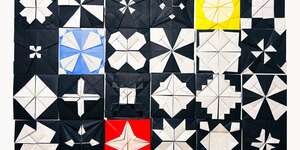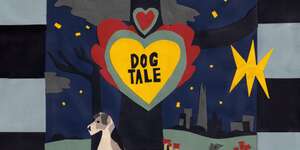PROJECTOR
PROJECTOR
country: UK
genre: Rock
styles: Post-Punk, Angular, Alternative

Now When We Talk It's Violence
 LP
LP
Spotify Bandcamp Soundcloud
Reviews and Comments
PROJECTOR unveil their debut album ‘NOW WHEN WE TALK IT’S VIOLENCE’, supported by an upcoming UK & EU tour and preceded by plays on BBC Radio 6Music & Radio 1 and features on Spotify's New Music Friday, All New Punk, the Indie List & Fresh Finds.
Reflecting on the title, bassist-singer Lucy says, “We as a society have failed to communicate. There’s no longer room for nuance, only shouting. Edward’s lyric ‘now when we talk it’s violence’ probably refers to a relationship, but I think it reflects something happening culturally.”
The album moves effortlessly between artful derangement, aggression and the pop hooks that have seen Projector gatecrash mainstream rock. At times it’s drenched in the grey brutalism of Joy Division, at others it’s a spectacular of hyperactive, Squid-flavour rant-pop. There are climaxes that stagger into acid-soaked country, warped with drum machines and lush harmonies, before leaping into blisteringly paranoid Incesticide-era grunge.
Sonic adventurousness contributed to the band’s decision to record and produce themselves at Lone Star Studio London, drummer Callum Marinho taking the lead with long-term collaborator Ben Hampson.
‘Lyrically,’ guitarist-singer Edward says, ‘I guess the album could be divided into the different stages of grief - anger, denial, a bit of acceptance. I didn’t get round to the others. I wrote them in quite a short burst, which enabled me to capture all of the facets of what I was feeling at the time and how generally unsure of myself I was… Though, he says, ‘I really hate the idea of people listening to my lyrics and being able to tell what they’re about, but because all the feelings were quite raw in this period they’ve come out slightly less opaque than usual.’’
No Guilt is an unremitting 2 minutes of disorientating high speed information. Lucy says, “We were thinking about bands like Talking Heads and Squid a lot. I imagine Edward playing this Stop Making Sense character, a deranged showman, every emotion warped out of proportion.” ‘Dubious Goals Committee’ follows that hyperactive, self-aware uncertainty ‘I am the god of all man, I am a piece of shit.’ Early single ‘Chemical’ follows a similar road of self effacement, anger, desperation.
‘Sunshine’ with its backdrop of ominous distorted soundscapes turns into a bittersweet goodbye: ‘take care, may you always be patient, and full of sunshine.’ Edward says, “This is my favourite song. It’s getting on towards acceptance. Feeling sad for what’s ended, but with no recriminations. Acknowledging all the hurt that’s been caused and kind of drawing a line under it moving on and wishing the other person all the happiness.” The title track also plays on a hopeful dissonance, a bouncing rhythm section carries the song to its anthemic chorus ‘but now when we talk it’s violence, we walk away with nothing to show…’
‘Don’t Give Anything Up for Love’ goes even further towards sincerity in its earnest appeal. Lucy says, “at the time I was getting so frustrated by people using issues like mental health and social justice to sell their product on social media. ‘Could you do it with no face, and be a cog in the works?’ is asking those people, would you go to a protest if you couldn’t put it on Instagram? I worry that social justice currently lives online in something ultimately translucent but real change comes from the digitally invisible people who do fundraisers, put leaflets through doors and organise demonstrations.”
Projector’s knack for deranged grunge emerges in songs like Breeding Ground, which takes off like a twisted hardcore track. Lucy says “It’s about the out of control feeling you get as a young person who’s bitten off more than they can chew, hence those lyrics ‘I’m still a boy throwing rocks at cars, I’ve been kissing with teeth.’ Taste like Sarah was written in similarly apt chaos, assembled in the studio the day of recording, vocals recorded live in the room with Edward and Lucy facing one another. “It’s about chess. There’s not many songs about chess.”
'Big Idea' merges this heaviness with Callum’s powerfully minimal drumming. Edward describes it as “Right at the bottom of the depression curve. Feeling overwhelmed by the unbearable weight of it all. Just playing over the ending, wondering what special combination of words would have made things better.”
“I’m quite proud of our album for being as obtuse, emotionally erratic and irritable as we are. I think music’s becoming homogenised because the industry wants everything in primary colours, easy to sell, easy to summarise. I think it’s patronising to music fans. I’m glad we stuck to our guns and took an inordinate amount of time to make a strange, emotionally complex, multifaceted piece of work. I think that’s a better reflection of who people really are today anyway.”
The album is available to order now on heavy-weight 180gm vinyl and CD via projectorprojector.co.uk, Bandcamp, Rough Trade, Resident Music and all good record stores.
latest releases
 Single
Single
Migraine
out on August 27, 2025
via Alcopop!
 Single
Single
It Surely Has Been Hell
out on July 15, 2025
via Alcopop!
 Single
Single
Collision
out on May 23, 2025
 Single
Single
The Sham! The Sham! The Sham!
out on March 14, 2025
 Single
Single
Sunshine
out on January 31, 2024
via PROJECTOR
 Single
Single
Dubious Goals Committee
out on January 03, 2024
Similar Artists and Bands


















